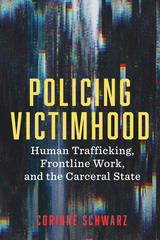
In Policing Victimhood, Corinne Schwarz interviewed with service providers in the Midwestern US, a region that, though colloquially understood as “flyover country,” regularly positions itself as a leader in state-level anti-trafficking policies and collaborative networks. These frontline workers’ perceptions and narratives are informed by their interpersonal, day-to-day encounters with exploited or trafficked persons. Their insights underscore how anti-trafficking policies are put into practice and influenced by specific ideologies and stereotypes. Extending the reach of street-level bureaucracy theory to anti-trafficking initiatives, Schwarz demonstrates how frontline workers are uniquely positioned to perpetuate or radically counter punitive anti-trafficking efforts.
Taking a cue from anti-carceral feminist critiques and critical trafficking studies, Schwarz argues that ongoing anti-trafficking efforts in the US expand the punitive arm of the state without addressing the role of systemic oppression in perpetuating violence. The violence inherent to the carceral state—and required for its continued expansion—is the same violence that perpetuates the exploitation of human trafficking. In order to solve the “problem” of human trafficking, advocates, activists, and scholars must divest from systems that center punishment and radically reinvest their efforts in dismantling the structural violence that perpetuates social exclusion and vulnerability, what she calls the “-isms” and “-phobias” that harm some at the expense of others’ empowerment. Policing Victimhood encourages readers to imagine a world without carceral violence in any of its forms.

Case studies explore how women’s rights shape state responses to sex trafficking and show how politically empowering women can help prevent and combat human trafficking
Human trafficking for the sex trade is a form of modern-day slavery that ensnares thousands of victims each year, disproportionately affecting women and girls. While the international community has developed an impressive edifice of human rights law, these laws are not equally recognized or enforced by all countries. Sex Trafficking and Human Rights demonstrates that state responsiveness to human trafficking is shaped by the political, social, cultural, and economic rights afforded to women in that state.
While combatting human trafficking is a multiscalar problem with a host of conflating variables, this book shows that a common theme in the effectiveness of state response is the degree to which women and girls are perceived as, and actually are, full citizens. By analyzing human trafficking cases in India, Thailand, Russia, Nigeria, and Brazil, they shed light on the factors that make some women and girls more susceptible to traffickers than others.
This important book is both a call to understanding and a call to action: if the international community and state governments are to responsibly and effectively combat human trafficking, they must center the equality of women in national policy.
READERS
Browse our collection.
PUBLISHERS
See BiblioVault's publisher services.
STUDENT SERVICES
Files for college accessibility offices.
UChicago Accessibility Resources
home | accessibility | search | about | contact us
BiblioVault ® 2001 - 2024
The University of Chicago Press









